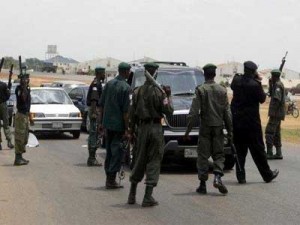In carrying out this regulation, many travellers driving in and out of Makurdi, the Benue state capital, were on Thursday, April 4, subjected to several hours of official terror. The disused toll gate plaza was taken over by policemen who, under the pretext of enforcing the restrictions on ‘tinted’ vehicle glasses, detained all drivers and passengers of vehicles that had privacy glasses.
According to a victim who was traveling from Abuja, they were detained for nearly six hours, though their experience was not as bad as those of some travellers heading towards Lafia and Abuja who were detained for even longer. By nightfall, some cars that had been on their way to Abuja since early in the morning were still at Makurdi. In the end, it became a matter of bargain; up to N7, 000 was reportedly paid by desperate travellers.
Last week, motorists in other parts of Nigeria, including Abuja, also ran into this police ambush. As early as 8am, police officers had stationed themselves at strategic points along major roads, especially at roundabouts and junctions where cars would slow down. At practically every location, they detained many cars for hours, disregarding even the plight of young children.
The Inspector General of Police, Mohammed Abubakar, who gave the order, may be within his rights to do so, but compared to the monumental challenges facing the Nigerian police and even bigger problems of security facing the country, the policy of on-the-spot arrest of drivers of vehicles with privacy glasses is not only misplaced, misguided and mistimed, but also gives the impression that the Nigeria police have nothing serious to do.
Considered from every angle, tinted glasses should be a priority: The decomposing bodies of 11 policemen killed in Bayelsa state were recovered last week. What the IG did not tell Nigerians is that the murdered officers were part of a 50-man team deployed from the police command headquarters in Yenagoa to escort some politically connected individuals to the burial of the deceased mother of Kile Torughedi, an ex-militant leader and now a special assistant to Governor Seriake Dickson on maritime security. Is that not a more serious issue than tinted glasses?
A week before, about 721 policemen and their families residing in the barracks at the Central Police Station, Onitsha, were rendered homeless following the demolition of their buildings and shops by the Anambra State Police Command. One of the victims, an Inspector, was reported as saying he had been living in the barracks for the past 21 years and had never defaulted on paying rent to the police authorities. In his words, “to just wake up and kick us out of our homes is an act of wickedness.”
Incidentally, on the issue of police welfare, what has the IG done to recover the over N30 billion stolen from the police pension funds? Surely, there must be legal ways to reclaim the staggering amount of money that was looted by the former director of police pensions who has been convicted for the crime. The welfare of serving and retired police officers all over Nigeria should be a more weighty issue than merely driving a car with darkened glasses.
Still on officers’ welfare, reports show that policemen on special duty are also complaining. For instance, some policemen recently deployed to Kano from MOPOL 4 Command, Ibadan, to combat the activities of Boko Haram allege that they had been without food and water for nearly two weeks due to delay in payment of allowances. One of them said, “We are not so sure who should be responsible for our welfare”. Disgruntled officers represent more serious security threats to Nigeria than tinted glasses.
It is not a secret that the Nigerian police remain one of the most distrusted public institutions in the country. It will be a tough ask to find any Nigerian (including serving and retired police officers!) who do not have troubling accounts to tell about the force. The withdrawal of policemen from checkpoints all over Nigeria was a welcome relief. Now, with this new directive on tinted glasses, the cat and mouse relationship between Nigerians and police has been renewed and stories of exhortation are coming out. Are there no better ways of utilizing police officers or building public confidence?
All told, considering the very grave security challenges facing Nigeria, a six-month public enlightenment campaign to sensitize owners of cars with tinted glasses and give them time to obtain the relevant permits would make much better sense. The order to detain citizens who simply happen to be driving cars they bought that way is a detraction from the real security issues and is akin to the return of roadblocks.

